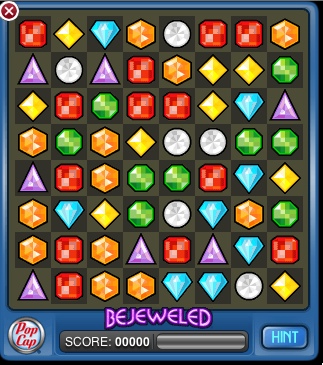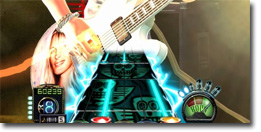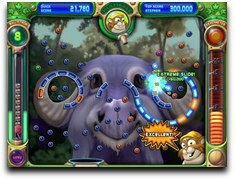 Congratulations to PopCap for showing why casual games will always be a viable market. Let’s put this in perspective, investors believe GTA IV will push 13-million sales by the end of 2008 and, as of January 2008, Halo 3 had sold 8 million copies. PopCap’s little casual game has hit 25 million units sold, that’s fairly impressive considering these blockbuster titles haven’t achieved such numbers.
Congratulations to PopCap for showing why casual games will always be a viable market. Let’s put this in perspective, investors believe GTA IV will push 13-million sales by the end of 2008 and, as of January 2008, Halo 3 had sold 8 million copies. PopCap’s little casual game has hit 25 million units sold, that’s fairly impressive considering these blockbuster titles haven’t achieved such numbers.
You may say “well, these titles sold 3+ million in the first week, what about Bejeweled?” True, Bejeweled probably didn’t hit 3 million in a week, but which game will still be played in 2010? Bejeweled or GTA IV and Halo 3?
Casual games age well, they’re not competitive on the graphic space and, instead, focus on fun value. Fun value is a lasting appeal and is immortal in the time line of video games. The same reason people still find fun in Pac-Man gamers still find cash to pickup their copies of Bejeweled.
Which game had the smallest budget? Bejeweled or GTA IV? We’re pretty sure PopCap did not give the bejeweled team $100-million to make it! Investors take notice, casual games have a long lasting appeal.
Read on for full press release details.
More Than 6 Billion Hours of the Original Match-3 Puzzler Played Worldwide Since 2000
SEATTLE, Washington – August 19, 2008 — PopCap Games, the leading developer and publisher of casual games, today provided updated statistics on its flagship franchise Bejeweled®, the most popular casual video game of the 21st century. Based on updated information from distribution partners across Web, mobile, retail, in-flight and other channels, Bejeweled and Bejeweled 2 have collectively sold more than 25 million units across all platforms since the game first appeared in late 2000.
“Considering we tried to sell Bejeweled outright to more than one industry giant back in the early days of our company, and got no takers even after reducing our asking price to $60,000, this little game has done all right for itself,” said Jason Kapalka, chief creative officer and co-founder of PopCap, and the original designer of Bejeweled and its sequel. “I vividly recall prospective buyers telling us ‘It’s not even a game,’ while showing us the door,” Kapalka laughed.
While the casual games “audience” is estimated at between 350 million and 450 million, this estimate is based on “regular” players, consumers who enjoy casual games on a monthly or more frequent basis; hundreds of millions of additional consumers have experienced a casual game, most often Bejeweled, at least once in their lives. More than 350 million copies of the Bejeweled/Bejeweled 2 have been downloaded from the Web, accounting for nearly a third of the 1 billion-plus downloads of all PopCap® titles. Tens of millions of copies of Bejeweled have been installed on mobile phones worldwide, and more than 25 million units of the game have been sold across all platforms, amounting to over $300 million in consumer spending over the history of the game. (Additionally, Bejeweled has garnered tens of millions of dollars in online advertising.)
For the past three years and counting, Bejeweled has consistently been among the top three “family entertainment” software titles sold at retail, while most hit video games achieve such ranking for one or two months. Likewise, the game has been one of the top three sellers among mobile games for more than three years running. Among PopCap’s own customer base, exposure to Bejeweled is exceptionally high: a survey of 13,000 PopCap customers conducted in April 2008 found that fully 95% of them had played Bejeweled in some form.
The Bejeweled franchise is also one of the most ubiquitous and accessible in the history of video games, with versions of the game available for Web, PCs and Macs, mobile phones, Xbox and PlayStation consoles, PDAs and Blackberrys, iPods and iPhone, in-flight on leading airlines, on-demand TV systems in hotels – even scratch-off lottery tickets in many states. All told, Bejeweled and Bejeweled 2 have collectively been enjoyed for an estimated 6 billion hours – the equivalent of 60 people playing the game 24 hours a day since the last Ice Age 11,400 years ago.
About PopCap
PopCap Games (www.popcap.com) is the leading multi-platform provider of “casual games” — fun, easy-to-learn, captivating computer games that appeal to everyone from age 6 to 106. Based in Seattle, Washington, PopCap was founded in 2000 and has a worldwide staff of over 200 people in Seattle, San Francisco, Chicago, Vancouver, B.C., Dublin, Ireland and Shanghai. Its games have been downloaded more than 1 billion times by consumers worldwide, and its flagship title, Bejeweled®, has sold more than 25 million units across all platforms. Constantly acclaimed by consumers and critics, PopCap’s games are played on the Web, desktop computers, myriad mobile devices (cell phones, smartphones, PDAs, Pocket PCs, iPod and more), popular game consoles (such as Xbox), and in-flight entertainment systems. PopCap is the only casual games developer with leading market share across all major sales channels, including Web portals, retail stores, mobile phones and MP3 players, and game device manufacturers.


 Since the release of
Since the release of  David Braben, founder of Frontier Developments, says retail outlets that buy and sell pre-owned games are “essentially defrauding the industry.” Although multiplayer gaming might not be a huge threat, the single player experience in games may die out because gamers play the game quickly and resell it back to places like GameStop for others to buy.
David Braben, founder of Frontier Developments, says retail outlets that buy and sell pre-owned games are “essentially defrauding the industry.” Although multiplayer gaming might not be a huge threat, the single player experience in games may die out because gamers play the game quickly and resell it back to places like GameStop for others to buy.
I will say Bejeweled 2 on XBLA is frustrating in that the Achievements are pure torture.